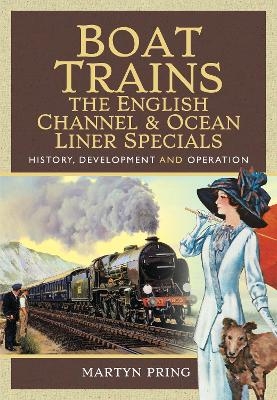
Boat Trains - The English Channel and Ocean Liner Specials
History, Development and Operation
Seiten
2020
Pen & Sword Transport (Verlag)
978-1-5267-6192-7 (ISBN)
Pen & Sword Transport (Verlag)
978-1-5267-6192-7 (ISBN)
Often forgotten in the history of ocean travel is the means of getting to the port. Martyn Pring brings the story of the boat train and how it connects ship to shore to life in this insightful and detailed history." Campbell McCutcheon.
In many ways this title featuring the evolution of cross-channel boat trains and the many dedicated services responsible for moving international passengers to and from trans-Atlantic steamers, is an extension of luxury railway travel. But that's not the full story as it encapsulates more than 125 years of independent and organised tourism development. At the end of the nineteenth century, faster and more stable twin-screw vessels replaced cross-channel paddlers resulting in a significant expansion in the numbers of day excursionists and short-stay visitors heading to Belgium, France and the Channel Islands. Continental Europe, as it had done since the end of the Napoleonic Wars beckoned, introducing ideas of modern-day mass tourism.
Numerous liners bestriding the globe were British domiciled. Major ports became hives of commercial activity involving moving freight and mail, as well as transporting all manner of travellers. Not only was there intense competition for passenger traffic between the Old and New World and Britain's imperial interests, greater numbers of well-heeled tourists headed off to warmer winter climes, and also experimented with the novel idea of using ocean steamers as hotels to visit an array of diverse destinations. Cruise tourism and the itinerary had arrived as 'Ocean Special' boat trains became essential components of railway and port procedures.
Whilst some railway operations were dedicated to emigrant traffic, continental and ocean liner boat trains were also synonymous with the most glamorous travel services ever choreographed by shipping lines and railway companies working closely in tandem. This well illustrated book explores the many functions of boat train travel.
In many ways this title featuring the evolution of cross-channel boat trains and the many dedicated services responsible for moving international passengers to and from trans-Atlantic steamers, is an extension of luxury railway travel. But that's not the full story as it encapsulates more than 125 years of independent and organised tourism development. At the end of the nineteenth century, faster and more stable twin-screw vessels replaced cross-channel paddlers resulting in a significant expansion in the numbers of day excursionists and short-stay visitors heading to Belgium, France and the Channel Islands. Continental Europe, as it had done since the end of the Napoleonic Wars beckoned, introducing ideas of modern-day mass tourism.
Numerous liners bestriding the globe were British domiciled. Major ports became hives of commercial activity involving moving freight and mail, as well as transporting all manner of travellers. Not only was there intense competition for passenger traffic between the Old and New World and Britain's imperial interests, greater numbers of well-heeled tourists headed off to warmer winter climes, and also experimented with the novel idea of using ocean steamers as hotels to visit an array of diverse destinations. Cruise tourism and the itinerary had arrived as 'Ocean Special' boat trains became essential components of railway and port procedures.
Whilst some railway operations were dedicated to emigrant traffic, continental and ocean liner boat trains were also synonymous with the most glamorous travel services ever choreographed by shipping lines and railway companies working closely in tandem. This well illustrated book explores the many functions of boat train travel.
Martyn Pring has a background in marketing, tourism and academia. He is currently an author and independent researcher with interests in culinary tourism, destination marketing, luxury branded sectors, travel histories as well as travel writing, A self-confessed railway, maritime and aviation enthusiast from a young age, he wrote the successful story of Luxury Railway Travel: A Social and Business History. Martyn lives and works in Dorset.
| Erscheinungsdatum | 15.01.2021 |
|---|---|
| Zusatzinfo | 150 colour & black and white illustrations, maps & posters |
| Verlagsort | Barnsley |
| Sprache | englisch |
| Maße | 172 x 246 mm |
| Themenwelt | Natur / Technik ► Fahrzeuge / Flugzeuge / Schiffe ► Schienenfahrzeuge |
| ISBN-10 | 1-5267-6192-0 / 1526761920 |
| ISBN-13 | 978-1-5267-6192-7 / 9781526761927 |
| Zustand | Neuware |
| Informationen gemäß Produktsicherheitsverordnung (GPSR) | |
| Haben Sie eine Frage zum Produkt? |
Mehr entdecken
aus dem Bereich
aus dem Bereich
Das Beste aus Stadt und Land.
Buch | Softcover (2024)
VUD Medien (Verlag)
CHF 16,80
Buch | Softcover (2024)
hidden europe publications (Verlag)
CHF 36,65
die visuelle Chronik der Schienenfahrzeuge
Buch | Hardcover (2024)
DK Verlag Dorling Kindersley
CHF 48,90


